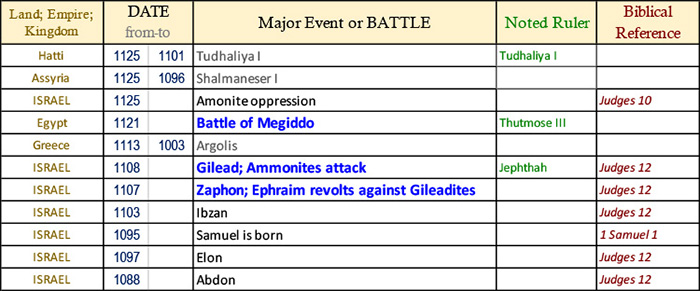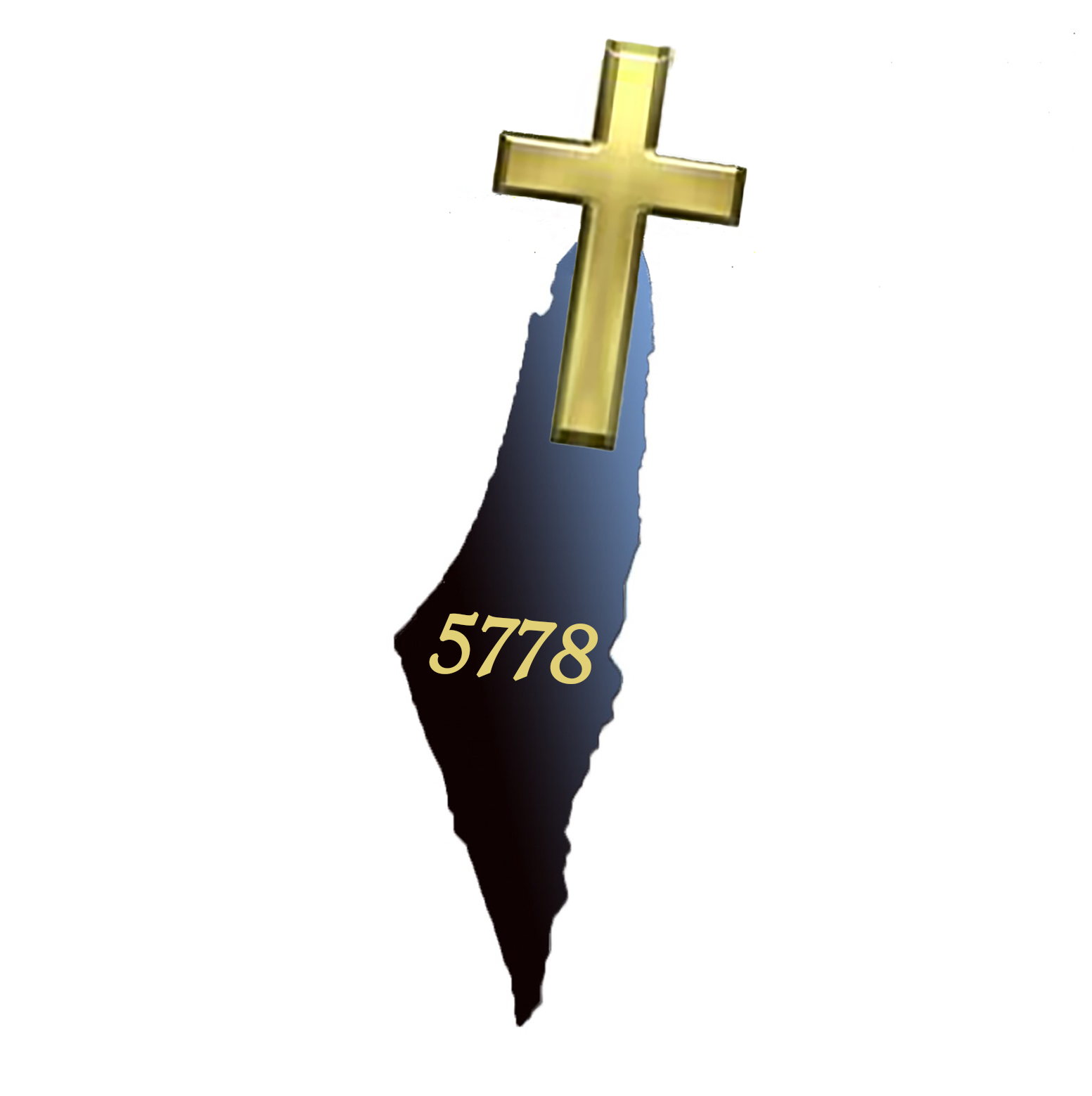Bible Battle #23 – C. 1108 BC
Jephthah was judge over Israel during a period when the people worshiped the pagan gods of the Ammonites and the Philistines. This left them open to attack by their enemies. As a means to vindicate his illegitimate origins, Jephthah demanded that he be made leader as a price to deliver the people from the clutches of the enemy. Jephthah vanquished the Ammonites with the help of Manasseh. Sadly, Jephthah robbed himself from tasting the victory he had won for his people due to a foolish vow that he had made before the Lord which would bear a catastrophic effect.
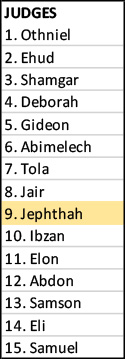
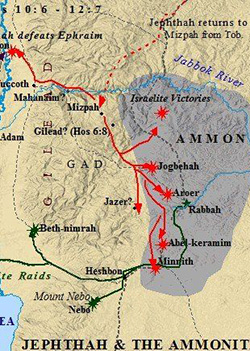
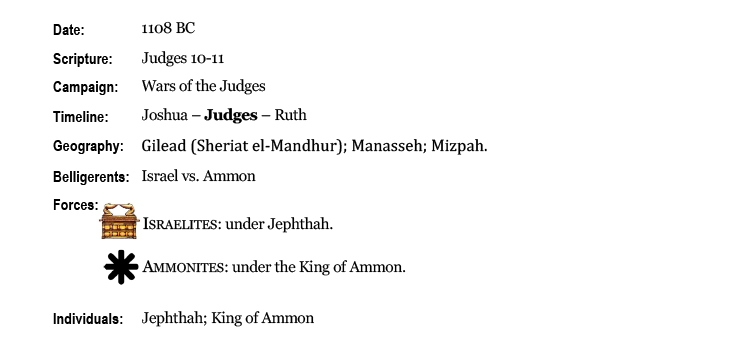
 Bible Battle BACKGROUND
Bible Battle BACKGROUND
Gilead 2
After Abimelek, new judges, Tola and Jair ruled consecutively for 45 years. Then Jephthah ruled throughout further degradation as the people turned to gods worshiped by the Ammonites and the Philistines.
Israel plunged into idolatry, worshiping seven false gods; Baal Ashtoreth, Aram, Sidon, and Moab among them. Not only were the people not focused on driving out the seven nations the Lord had commanded, but they had turned to seven false gods.
Strategically, the Israelites were in a dangerous vice. The Philistines took up the coast to the west and the Ammonites the land east of the Jordan.
God was angered and permitted both these enemies to rule over the people.
After 18 years of rule, the Ammonites crossed the Jordan to attack the tribes of Judah, Benjamin, and Ephraim.
This domination was too much for the Israelites, and so, again, they renounced their paganism. Until now, God had always come to their rescue, but this time He intended to leave them alone and let them handle it themselves. God stated that now that they were in peril, they should ask for the help of the gods they worshiped.
The people responded by repenting; they cleaned their land of all the demonic statues. Although the Israelites seemed to repent more out of panic than out of a purer heart, God accepted their repentance and, at the eleventh hour, took their trouble to heart and offered a way out.
This episode was 300 years after the original invasion of Moab by the Hebrews, and here lay the basis of their claim to this land.
 Bible Battle PRELUDE
Bible Battle PRELUDE
Gilead 2
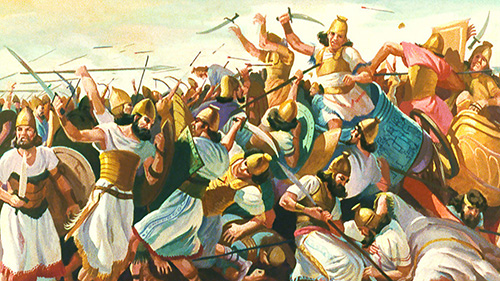
The Ammonites set up camp in Gilead and the Israelites at Mizpah. A familiar pattern re-surfaced as the Hebrew leaders promised leadership of the land to whoever took up the task of defeating the enemy.
Jephthah was a Gilianite and mighty warrior but had been shunned by his family due to his illegitimate birth. He went to live in the land of Tob and surrounded himself with scoundrels. These were men jaded and bored; they were looking for action and were happy to be under Jephthah.
When this fight came upon, Gilead, the elders, came to Jephthah to take over the army. Jephthah demanded that he become the leader of the people as a price.
They accepted, and Jephthah began communication with the Ammonite king, who explained he wanted to take back the land the Israelites took from them (from Arnon to Jabbok to the Jordan). Jephthah proceeded to give this king a history lesson reminding him that different nations had refused the Hebrews right of passage after the exodus from Egypt attacked them and subsequently lost their territory to them. The Hebrews may have occupied this land more as a defensive buffer against future enemy incursion into the promised land rather than conquering it for conquest’s sake. Jephtha’s argued that each people should be content with the area given to them by their deity. Israel had been there for 300 years, so why did the Ammonites chose this moment to turn against them when they could have done it earlier? The king of Ammon had no reply, for he must have recognized that he was unjustified.
Since the God of Israel gave this land to His people, then nobody had the right to take it back. It was on this certainty that Jephtha grounded his assurance of victory.
God’s Spirit had come over Jephthah as he approached the Ammonites. It was at this time that Jephthah made a strange vow before God: if God gave him a clear victory, he would sacrifice a burnt offering to Him. Jephthah assigned this sacrifice to be whatever came out of the door of his house to meet him upon his victorious return home.
 Bible Battle REPORT
Bible Battle REPORT
Gilead 2
- The Ammonites continued their periodic raids westward.
- Jephthah closed in in the enemy from Gilead and Manasseh and through Mizpah of Gilead.
- The Israelites attacked south in a lighting thrust, cutting off the enemy’s supply base and escape. The Israelites routed the Ammonites from Minnith to Abel Keramim, taking 20 cities and massacring the enemy.
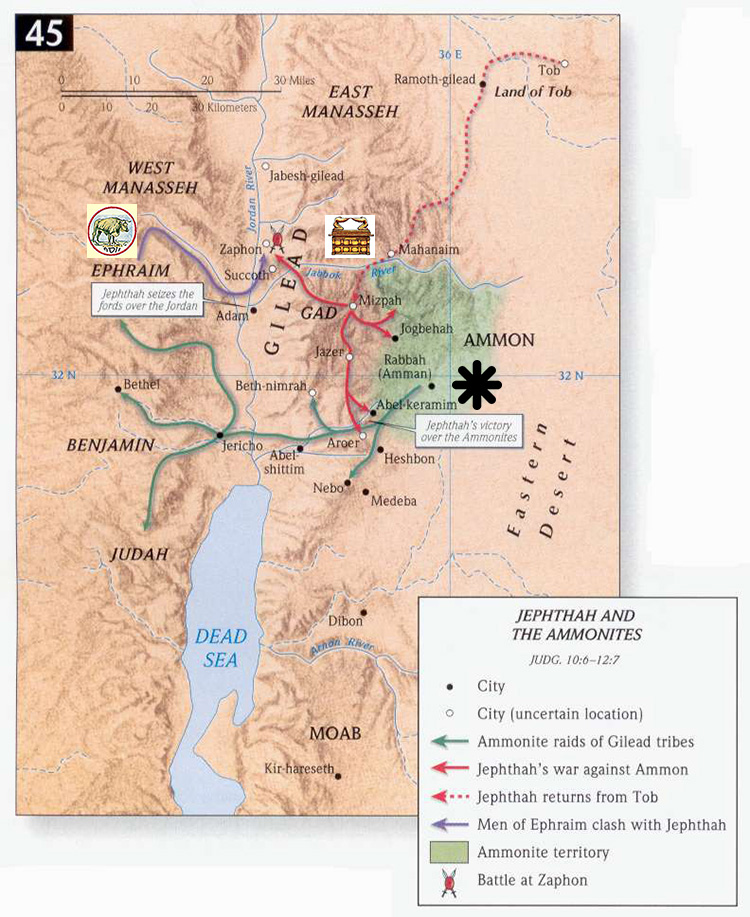
The remaining Ammonites were subdued by Israel.
 Bible Battles AFTERMATH
Bible Battles AFTERMATH
Gilead 2
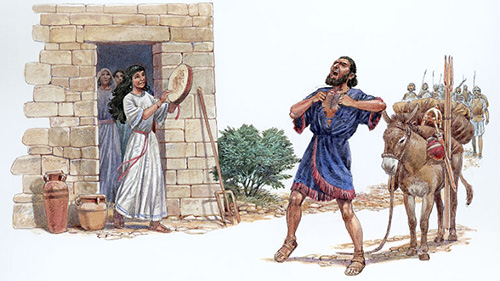
A LOSING WIN
One of the reasons Jephthah hastily vow to sacrifice to God the first thing that came out of his house was because the animal room was, perhaps, the closest to the entrance of the house. It would have been reasonable to see an animal before an inhabitant when going into such a dwelling.
Sadly, when Jephthah returned home to fulfil his part of the self-imposed vow, it was his daughter who came out of his front door to greet him. In a bottomless pit of despair and anguish, Jephthah forced himself to honour his promise and kill his only child to offer it to God.
The daughter urged her father to carry out his promise, reminding him that God had delivered His people from harm.
Jephthah’s nameless daughter is a true hero in this battle, and it became customary for the young women of Israel to mourn her for four days each year.
A THREAT REMOVED
The Ammonites had been a threat to The Hebrews ever since they came out of Egypt. Israel did not want a fight but, when finally cornered, with no choice reminding, they fought and removed this threat. The Ammonites were now wholly under Hebrew rule.
 SPIRITUAL WARFARE
SPIRITUAL WARFARE
Gilead 2
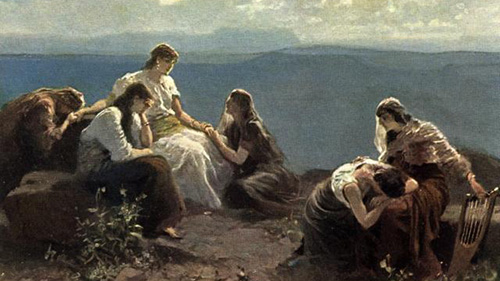
MODERN FALSE GODS
The local belief system in the Ancient Middle East was that each part of the land had a local deity that blessed that land. The Israelites were focused on the natural immediately in front of their eyes: the property. They thought that the local fake gods better blessed that land they inhabited than by the real mighty God who had delivered them time and time again.
Today people do this with governments. For example, when a government over a nation promotes same-sex marriage and chastises those against it, it is easier for people to side with the new law – the pagan law – than with God’s principles. Here is where many compromises just as the Israelites did in Gilead.
THE TABLES TURN
Not long before, Jephthah was not good enough to live among his people, but when they needed him, they came on his knees. Jephthah was the only one that could do it, for he had stayed away from society and therefore not participated in their heretical worship. Nevertheless, regardless of his motives, Jephthah cleverly took the opportunity to take leadership of the people as well as the command of the army. This seemingly opportunistic move is not immediately unvirtuous.
LACK OF FAITH TURNED DEADLY
The foolish vow was like those cases where people are in trouble and make God promises in exchange for Him delivering them from where they are.
Scripture has reminded us through the ages on the importance of vows.
Ecclesiastes 5:5
Better is it that thou shouldest not vow, than that, thou shouldest vow and not pay.
Because this is so, vows should not be made lightly, in haste or under pressure, as Jephthah did.
Matthew 5:34
But I say unto you, Swear not at all; neither by heaven; for it is God’s throne.
Jephthah didn’t have to make that vow. We see that later Reuben, Gad and half-tribe of Manasseh fought n even greater coalition and defeated them merely by crying out to God. They didn’t make any vows. Jephthah started the battle in good standing with God but finished it with a distance from God put there by religion.
This vow was a religious act that fails to take into account the true nature of God. God would have stopped the sacrifice as he had done with Abraham and Isaac. But he just carried out religiously. Satan used something based on God’s directions, twisted it and had it as the backing for one of the worst offences.
Another way to look at this tragedy is the persistent problem of fear. Fear is the polar opposite of faith. God’s language is faith; He can bless believers who amass and operate in faith. The Devil’s language is fear; all other sins – such as greed, pride and lust – originate from it. Jephthah had a revelation on which he stood: that God would win this battle for him. Unfortunately, Jephthah did not ground this Rhema word deep in his heart.
Matthew 13:19
When anyone hears the word of the kingdom and does not understand it, then the wicked one comes and snatches away what was sown in his heart.
Jephthah quickly heeded to the pressures and lies of Satan: that God’s truth was not enough. For that reason, Jephthah impulsively asked, again, for a victory that was already his. Jephthah ignored the grace of God and though to solidify his guarantee of triumph with an additional pledge to God.
Smith Wigglesworth said that “if you pray seven times for the same thing, you have prayed six times in unbelief.”
 Bible Battles TIMELINE
Bible Battles TIMELINE
Gilead 2
